Silica - Study guides, Class notes & Summaries
Looking for the best study guides, study notes and summaries about Silica? On this page you'll find 1078 study documents about Silica.
Page 4 out of 1.078 results
Sort by
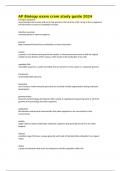
-
AP Biology exam cram study guide 2024
- Exam (elaborations) • 152 pages • 2024
-
- $15.59
- + learn more
AP Biology exam cram study guide 2024 emergent properties new properties that emerge with each step upward in the hierarchy of life, owing to the arrangement and interactions of parts as complexity increases inductive reasoning reasoning based on observed patterns polymer large compound formed from combinations of many monomers meiosis a process in cell division during which the number of chromosomes decreases to half the original number by two divisions of the nucleus, which...
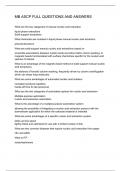
-
MB ASCP FULL QUESTIONS AND ANSWERS
- Exam (elaborations) • 62 pages • 2024
-
- $15.59
- + learn more
What are the two categories of manual nucleic acid extraction liquid phase extractions Solid-support extractions What chemicals are included in liquid phase manual nucleic acid extraction phenol/chloroform What are solid-support manual nucleic acid extractions based on reversible associations between nucleic acids and silica matrix column packing, or magnetic beads functionalized with surface chemistries specific for the nucleic acid species of interest What is an advantage of the magneti...
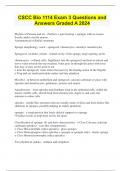
-
CSCC Bio 1114 Exam 3 Questions and Answers Graded A 2024
- Exam (elaborations) • 10 pages • 2024
-
- $14.49
- + learn more
Phylum of Parazoa and etc - Porifera = pore bearing = sponges with no tissues Sessile adults, mostly marine Asymmetrical or Radial symmetry Sponge morphology voacb - spongocel, choanocytes, mesohyl, amoebocytes Spongocel, osculum, ostium - central cavity of the sponge, large opening, pores choanocytes - collared cells; flagellated, line the spongocel and beat in unison and move water towards the top osculum; water goes in through the pores with food that may or may not be good to eat ...
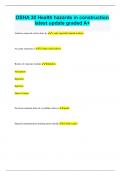
-
OSHA 30 Health hazards in construction latest update graded A+
- Exam (elaborations) • 7 pages • 2024
- Available in package deal
-
- $9.99
- + learn more
OSHA 30 Health hazards in construction latest update graded A+ Asbestos removal can be done by c. only specially trained workers An acute exposure is D. both a and b above Routes of exposure include Inhalation Absorption Ingestion Injection Direct Contact the most common form of crystalline silica is quartz Hazard communication training must include d. both a and c what are the elements that must be included on an sds A. physical and chemical characteristics, health eff...
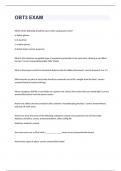
-
OBT3 EXAM 2024 WITH 100% CORRECT ANSWERS
- Exam (elaborations) • 26 pages • 2024
- Available in package deal
-
- $17.49
- + learn more
Which of the following should be worn when using power tools? a) Safety glasses b) A hard hat c) Leather gloves d) Safety boots correct answersA What is the minimum acceptable type of respiratory protection to be used when cleaning a soot filled furnace? correct answersDisposable Filter Masks What is the proper vertical to horizontal distance ratio for ladder placement? correct answers3:1 or 4:1 What muscles or parts of your body should you primarily use to lift a weight from th...
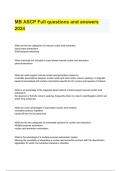
-
MB ASCP Full questions and answers 2024
- Exam (elaborations) • 74 pages • 2024
-
- $7.99
- + learn more
MB ASCP Full questions and answers 2024 What are the two categories of manual nucleic acid extraction liquid phase extractions Solid-support extractions What chemicals are included in liquid phase manual nucleic acid extraction phenol/chloroform What are solid-support manual nucleic acid extractions based on reversible associations between nucleic acids and silica matrix column packing, or magnetic beads functionalized with surface chemistries specific for the nucleic acid spe...
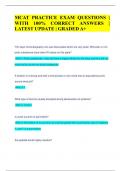
-
MCAT PRACTICE EXAM QUESTIONS | WITH 100% CORRECT ANSWERS | LATEST UPDATE | GRADED A+
- Exam (elaborations) • 22 pages • 2024
- Available in package deal
-
- $9.49
- + learn more
Thin layer chromatography can use silica plates which are very polar. Will polar or non polar substances have lower Rf values on this plate? ANS -Polar substances - they will have a higher affinity for the silica and thus will not travel as far as the non polar substances A titration of a strong acid with a strong base or vice versa has an equivalence point around what pH? ANS -7 What type of bond is usually disrupted during denaturation of proteins? ANS -H bond Is uracil a purine or...
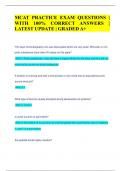
-
MCAT PRACTICE EXAM QUESTIONS | WITH 100% CORRECT ANSWERS | LATEST UPDATE | GRADED A+
- Exam (elaborations) • 22 pages • 2024
- Available in package deal
-
- $9.49
- + learn more
Thin layer chromatography can use silica plates which are very polar. Will polar or non polar substances have lower Rf values on this plate? ANS -Polar substances - they will have a higher affinity for the silica and thus will not travel as far as the non polar substances A titration of a strong acid with a strong base or vice versa has an equivalence point around what pH? ANS -7 What type of bond is usually disrupted during denaturation of proteins? ANS -H bond Is uracil a purine or...
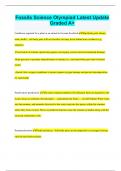
-
Fossils Science Olympiad Latest Update Graded A+
- Exam (elaborations) • 21 pages • 2024
- Available in package deal
-
- $9.99
- + learn more
Fossils Science Olympiad Latest Update Graded A+ Conditions required for a plant or an animal to become fossilized Hard body parts (bones, teeth, shells) - soft body parts will not fossilise, but may leave behind trace evidence (e.g. imprints) -Preservation of remains (protection against scavenging, erosion and environmental damage) -High pressure to promote mineralisation of remains (i.e. turn hard body parts into fossilised rocks) -Anoxic (low oxygen) conditions to protect against ...
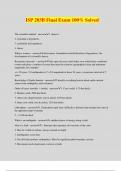
-
ISP 203B Final Exam 100% Solved
- Exam (elaborations) • 16 pages • 2024
-
- $12.49
- + learn more
ISP 203B Final Exam 100% Solved The scientific method - answer1. observe 2. formulate a hypothesis 3. test/falsify the hypothesis 4. theory What is science: - answerobservation, formulation and falsification of hypotheses, the development of a scientific theory. Recurrence intervals: - answerTime span (in years) until today over which these combined events took place / number of events that meet the criterion (geographical area and minimum magnitude, for example) -ex: 50 years / 10 ear...

Do you wonder why so many students wear nice clothes, have money to spare and enjoy tons of free time? Well, they sell on Stuvia! Imagine your study notes being downloaded a dozen times for $15 each. Every. Single. Day. Discover all about earning on Stuvia


